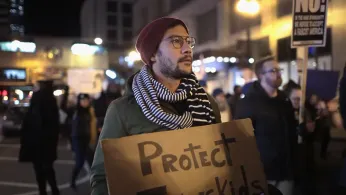
Jul 24
Trans people in Illinois prepare for the Trump years
Noah Berlatsky, Prism READ TIME: 5 MIN.
Alameda, CA (Prism) The blue state has been aggressive in pursuing trans rights, but many are still working to protect their health and safety during Trump's presidency
Newly elected President Donald Trump and his Republican Congress have threatened to ramp up discrimination and repression directed at trans people. Trump, during his campaign, promised to end all gender-affirming care for minors. An emboldened, Republican, transphobic House of Representatives has already passed a ban on trans girls and women participating in women's sports; schools that defy the restriction face a loss of federal funding. On his first day, Trump passed a flurry of transphobic executive orders, including one that requires that "government-issued identification documents" deny trans people's gender identity.
Some blue states like Illinois have been aggressive in pursuing trans rights. The state has guaranteed trans women's access to women's bathrooms in their place of employment, and the state recently passed a law making it easier for trans and nonbinary people to change their gender markers on state ID. Nonetheless, many trans people in the state are worried about what a Trump presidency will bring and are taking steps to protect their health and safety.
"The biggest thing, the most pressing fear on our minds, is we need to keep our hormones," said Anton, a 20-year-old trans man in Chicago who is using a pseudonym to protect his identity due to safety concerns. "You can't go into the closet once you're out, but you can get your life-saving medication taken away."
Anton said he didn't feel under imminent threat in Illinois. He's been able to work as an after-school counselor. "If I lived in the South, I would not have gotten this job so easily," he said. He's considering taking advantage of Illinois' trans-friendly regulations and switching his gender markers. He's also been encouraging trans friends from red Southern states such as Florida to move to Illinois for easier health care access.
He also said that although he has access to health care now, he is aware that people manufacture hormones and that there are networks of distributors. That's something a lot of trans people are aware of and thinking about as options as they wait to see what kind of restrictions and bans Trump puts into place.
Zenobia, a young trans woman in Chicago who did not want her full name published due to safety concerns, has also been worried about hormone availability. She said that one option for trans people concerned about access to health care in the long term is to ask providers to increase the dosage or concentration so that the hormones last longer. She also said that as a precaution, she's thinking about connecting with people who synthesize and store supplies.
Zenobia noted that while she is worried about restrictive legislation under Trump, in some ways, the bigger concern is that Trump and Republicans will normalize and model transphobia, prompting people to harass and discriminate against trans people in daily encounters.
"I think that the most important thing that we can do as a community is not hide," she said. "A lot of people are very scared, and I feel like that creates this impulse to kind of recede away from society. And I don't think that's the right response. I think now more than ever, trans people need to be active in the conversation."
Zenobia also said that health care reform or moving to a single-payer system would be a huge boon for trans people, who are disproportionately poor and can have great difficulty navigating America's byzantine web of insurance and health care access.
Even when trans people do get health care access, the excessive complexities of the system can create dangerous vulnerabilities for them and their providers, according to Linda, a family practitioner in Cook County who treats numerous trans patients and did not want her real name published out of fear of being targeted.
Testosterone is a controlled substance nationally, which means that when doctors prescribe it, those prescriptions are noted on their record, Linda said. That means the state is essentially tracking doctors who specialize in trans care or who are popular with trans patients -- and that information could be used to target care providers at some point.
In part because of such concerns, Linda said she has been taking steps to protect her patient's medical records. She's been avoiding marking down "gender dysphoria" or "trans" on medical charts, instead using code or alternate diagnoses for hormone therapy.
Linda said it would help if Illinois stopped tracking testosterone prescriptions or if the state had a policy strictly restricting access to the physician monitoring program.
"I've just gotten super paranoid about what could possibly happen in an Octavia Butler world," she said. "If they come after low-hanging fruit," she said, "I would be low-hanging fruit."
Along with trans people and trans health care providers, some nonprofit organizations have begun to prepare for the transphobia of the Trump years. Distribute Aid, a queer-led humanitarian aid team, is creating up to 24,000 hormone replacement therapy (HRT) harm reduction kits, which will include syringes, needles, and alcohol wipes distributed through local partners.
"Looking at the rhetoric coming out of the 2024 election, we saw there would be a need to provide safe access to medical items for trans people who were taking HRT," Taylor Fairbanks, co-founder and director of development of Distribute Aid, told Prism.
Fairbanks emphasized that Distribute Aid was not providing hormones or medication. "We know that folks get HRT, like hormones, through their health care provider or through DIY HRT networks. They make it themselves; they get it from friends. We are simply providing the medical items that are needed to take injection-based HRT safely."
Distribute Aid plans to start its distribution efforts in the Southeast, where trans health care is most under threat and where the organization already has strong local networks because of its work distributing aid during Hurricane Helene in 2024. Fairbanks said the group hopes eventually to expand to other parts of the country where else there is need.
Fairbanks also said that people in blue states can do a lot to help people elsewhere in the country. That includes donating to groups providing aid and working to make blue states and communities welcoming. "I'd say that one thing I think we should be very careful of is not to abandon trans folks in red states, right? There's too many people who need help," Fairbanks said. "Not everyone is able to leave or wants to leave, and so it's important to welcome people into our communities while still supporting them where they're at, for the folks who choose to stay."
People in blue states or in cities are at less risk. But no trans person is fully safe in the U.S. as long as the federal government is committed to bigotry and persecution, Fairbanks and other advocates say. Making sure trans people in Illinois are safe is part of building resources and capacity to protect trans people in red states, they say, and making sure they can access refuge and resources going forward.






